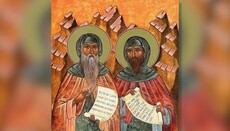Jesus Prayer – the surest path to salvation in our time

“And as Jesus passed by from there, two blind men followed Him, crying out: Have mercy on us, O Jesus, Son of David!” (Matthew 9:27)
The blind men invoked the name of Christ – and their eyes were opened. We hear this account in the Sunday Gospel reading. The invocation of Christ’s name has become one of the most powerful practices of salvation. Its essence is strikingly simple – and therein lies its greatest strength.
If we are attentive to our inner life, we will quickly discern that our greatest enemy is our own thoughts. More precisely, it is the mind, dominated by thoughts, which forces us to dwell wherever it chooses.
Modern man is like a dog lover – only the dog is the one walking him. Wherever the dog’s curiosity leads – to sniffing a trash heap or chasing a cat – it drags the owner along. News, distractions, events near and far – all become subjects of our restless interest. Our mind contains everything but God.
This happens because the mind has abandoned its true dwelling place – the spiritual heart – and now wanders aimlessly through the world.
Christ spoke more than once of the danger of distraction as a threat to salvation. Since the Fall, man has lost authority over his mind and has become enslaved to his own thoughts. We no longer think with our heads – our heads think us.
And so the first and foremost discipline we must cultivate is this: to keep the mind in God – if not always, then at least as long and as often as possible. Not merely to remember God, not simply to acknowledge His existence, but to dwell consciously in His energy.
This requires anchoring all our attention in prayer. But how is that done?
When we read long texts, the mind easily wanders – it is hard to maintain sustained focus. The most effective method is a brief prayer phrase, one that keeps attention fixed on its words. And such a salvific formula is found in the Jesus Prayer.
Three advantages of the Jesus Prayer
First, it is simple – just a few words.
Second, it contains within itself the name of God.
There has been much controversy over the divine name. Those who believed that the uncreated grace of the Lord is present in the name of God were condemned by armchair theologians – lacking prayerful experience but full of book knowledge – and labeled heretical “name-worshippers.” Yet many saints, such as Righteous John of Kronstadt, explicitly declared that the name of God is God Himself in His energies. This is known and confirmed by all who have truly practiced the Jesus Prayer.
Third, its content is penitential. In unceasingly repeating this prayer, the soul breathes in grace with the sweet name of Christ in the words “Lord Jesus Christ,” and breathes out its sinfulness with the words “have mercy on me, a sinner.”
There are no obstacles to the constant recitation of this prayer. Sitting or lying down, walking or working, aloud or silently, in solitude or among crowds, with every breath or every step – it can be uttered attentively, reverently, and with repentance. Its only true enemy is our distraction – the invasive thoughts that break in and interrupt the prayer with their intrusive chatter.
But if a person discovers this path, they will find joy in solitude, for there is no greater bliss than unceasing conversation with God.
On the other hand, the person who never learns this way will spend their life fleeing from themselves, chasing after outer experiences – until eventually, their egoism devours them with restlessness, despondency, and fear.
Circular motion of the mind
The Jesus Prayer is sometimes called “circular.” In contrast to the linear motion of the mind directed outward to worldly objects, the circular movement draws the mind back into itself, to its source.
The Holy Fathers distinguished between the mind as the essence of the soul – the spirit located in the heart – and the mind as energy, the power of thought, which flows freely in all directions.
To enclose the mind in the heart through the Jesus Prayer is to bring this wandering energy back to its beginning. It is the state in which the spirit gathers its forces into itself. True communion with God can occur only from such an inwardly gathered state.
In the silent cry from the heart “Lord Jesus Christ,” the mind rises wordlessly to the Lord Himself. With the words “have mercy on me,” it descends again into the depths of the soul, awakening an awareness of one’s own sinfulness.
Thus, the Jesus Prayer becomes a circular journey: we ascend to God, and then descend in repentance into the prison of our own soul.
Those who practiced this noetic work testified: it is the most direct and shortest path to the purification of mind and heart.
Persecution for living faith
And because this path is so powerful, Satan rises up in fury against those who walk it and lead others along.
He stirred up fierce persecution against Elder Joseph the Hesychast – to such an extent that nearly all the monks of Mount Athos deemed him deluded. “My whole life has been one long martyrdom,” wrote the elder, “and most of all, I suffer from other people.” Even St. Paisios the Athonite, swayed by slander, avoided visiting his skete – something he later deeply regretted.
Now the same fate has befallen Elder Simon (Bezkrovny), through whose writings thousands have taken up the path of the Jesus Prayer.
Those who imagine themselves great “theologians,” yet have no idea what the word truly means, have always persecuted – and will continue to persecute – those who lead souls to Christ. They once reviled St. Porphyrios of Kavsokalyvia, accusing him of “black magic,” and they will revile any who dare to step outside the barracks of self-righteous “soldiers.”
The dead will always hate the living, just as the grey mediocrity of the world cannot tolerate those rare souls who remain vibrant and free.
And yet it is precisely these souls – battered though they may be – who become good shepherds, leading others to salvation, even as they carry a heavy and painful cross through this life.
But I am certain of this: those who have once tasted the sweetness of prayer, who can distinguish the honey flowing from the mouths of the saints from the gall of dead hearts – such souls will never turn back from the path they have chosen.
“For I am convinced that neither death, nor life, nor angels, nor principalities… nor height, nor depth, nor anything else in all creation, shall be able to separate us from the love of God that is in Christ Jesus our Lord” (Romans 8:38–39).











